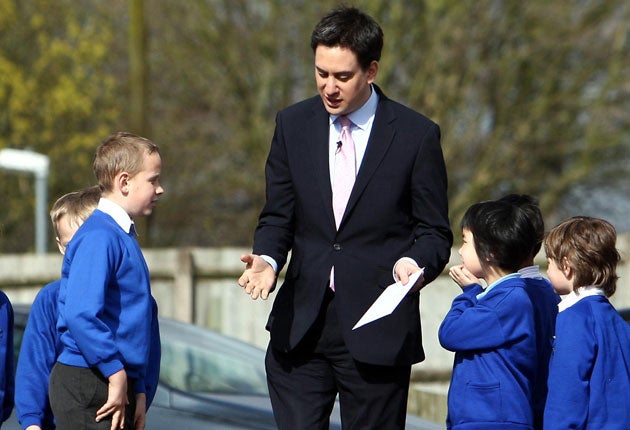Miliband says 'fighting cuts' is election theme

Your support helps us to tell the story
From reproductive rights to climate change to Big Tech, The Independent is on the ground when the story is developing. Whether it's investigating the financials of Elon Musk's pro-Trump PAC or producing our latest documentary, 'The A Word', which shines a light on the American women fighting for reproductive rights, we know how important it is to parse out the facts from the messaging.
At such a critical moment in US history, we need reporters on the ground. Your donation allows us to keep sending journalists to speak to both sides of the story.
The Independent is trusted by Americans across the entire political spectrum. And unlike many other quality news outlets, we choose not to lock Americans out of our reporting and analysis with paywalls. We believe quality journalism should be available to everyone, paid for by those who can afford it.
Your support makes all the difference.Ed Miliband claimed Labour would be the public's "first line of defence" against the Coalition Government's spending cuts yesterday as he launched his party's campaign for the 5 May local elections.
Labour is expected to gain about 1,000 seats in elections to local authorities in most parts of England outside London and Cornwall. Election experts believe Labour should win about 700 seats from the Conservatives and about 300 from the Liberal Democrats.
The Tories are defending a total of 5,023 seats, the Liberal Democrats 1,866 and Labour 1,620 in 36 metropolitan districts, 49 all-purpose unitary councils and 194 district councils.
Although the cuts should help Labour to make big headline gains, Mr Miliband faces a tricky hurdle of his own. Labour needs to start to fight back in the South, where it did poorly outside London in last year's general election and must recover to have to any chance of regaining power nationally in 2015. "These elections will be a test of whether we are getting over our southern discomfort," one Labour frontbencher admitted.
Labour has no councillors in 78 district councils and fewer than 10 in a further 71. Its problem in the South mirrors David Cameron's trouble in winning "friends in the North", Labour's traditional stronghold, at last year's general election.
Voting for the Scottish Parliament, Welsh and Northern Ireland Assemblies is also on 5 May. The referendum on whether to replace the first-past-the-post system with the alternative vote (AV) will be held on the same day.
The party facing the biggest headache in England's town hall elections is the Liberal Democrats, who have "lost" about half the people who backed them in last year's general election, opinion polls show. Although Nick Clegg's party has traditionally outperformed its national poll ratings in local contests, it may prove harder now that it is in government. It could suffer a backlash over the hike in tuition fees in areas with universities such Oxford, Cambridge, Bath, Bristol and Norwich. Another factor which could harm its prospects is that a Labour recovery in Conservative-Liberal Democrat battlegrounds could take votes from the Liberal Democrats and help the Tories to win seats.
Mr Clegg faces defeat by Labour in Liberal Democrat-run Sheffield, where he represents the Hallam constituency. He will be desperately hoping to hang on to power in Bristol and either Hull or Newcastle. Retaining two of these four flagship councils might help him avoid headlines about a "Lib Dem meltdown".
The Tories will seek to avoid ceding control to Labour in Dudley, Bury and Birmingham (where they share power with the Liberal Democrats). Launching Labour's campaign in Birmingham, Mr Miliband put cuts to town hall budgets at the heart of his party's efforts. He claimed they would cost an average two-adult household with two children £182 in the 2011-12 financial year. "We will be your voice in tough times," the Labour leader told voters. "Areas with the greatest need are being asked to bear the greatest burden. The worst off areas are being hit the hardest. Labour will be your first line of defence against the damage being done by a Conservative-led Government and its Liberal Democrat allies."
But the Housing minister, Grant Shapps, conceded on Channel 4 News last night: "If you are entirely reliant, or largely reliant, on central government, then of course when central government is having to make cuts because we don't want the country to go bust, of course those are the areas who end up seeing the biggest reduction in spending."
Join our commenting forum
Join thought-provoking conversations, follow other Independent readers and see their replies
Comments